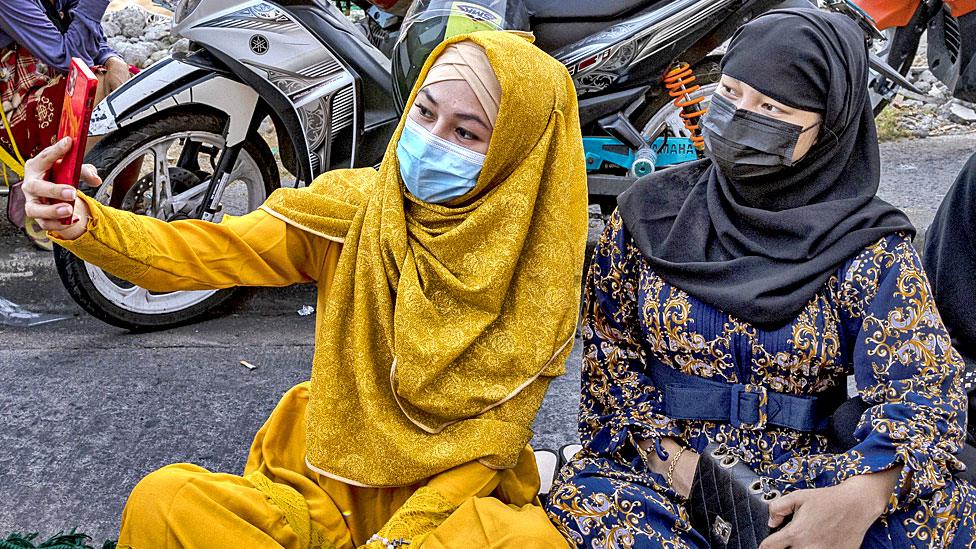Eid celebrations squeezed by cost of living crisis
- Published
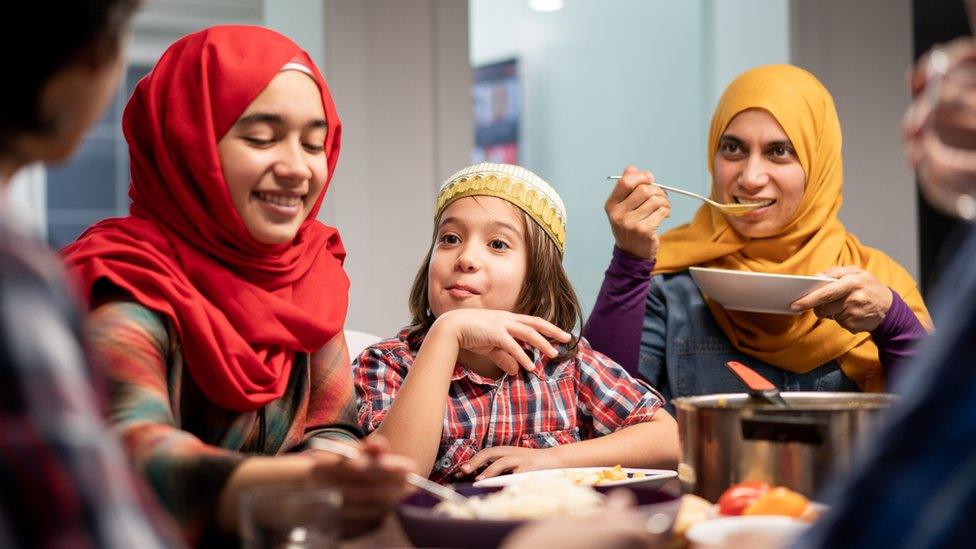
The sun is beginning to set over Hyde Park in Leeds, and from inside Abu Bakr supermarket, the smell of spiced lamb kebabs, rich curries and plump pockets of fresh samosa drift across the street outside.
The store is busy when we visit; popular with local students and bustling with British Muslim families preparing to break their fast when the sun goes down or buying gifts for forthcoming celebrations.
It should be the busiest time for Abid Hussain's business. But he is noticing a change.
"This year has been very different and a very difficult year for people," he says. "In the month of Ramadan, people should be spending more than usual, but this year there has been a decrease. People have been spending much less."
Monday is the festival of Eid al-Fitr, marking the end of the month-long dawn to sunset fasting of Ramadan. It is a time of contemplation, but also sharing and celebrating with loved ones. But this year, the cost-of-living crisis is squeezing hard.
Abid gestures to fresh produce, piled high. "Customers are cautious. Normally they would buy a box of tomatoes, but now they're buying just a few," he explains.
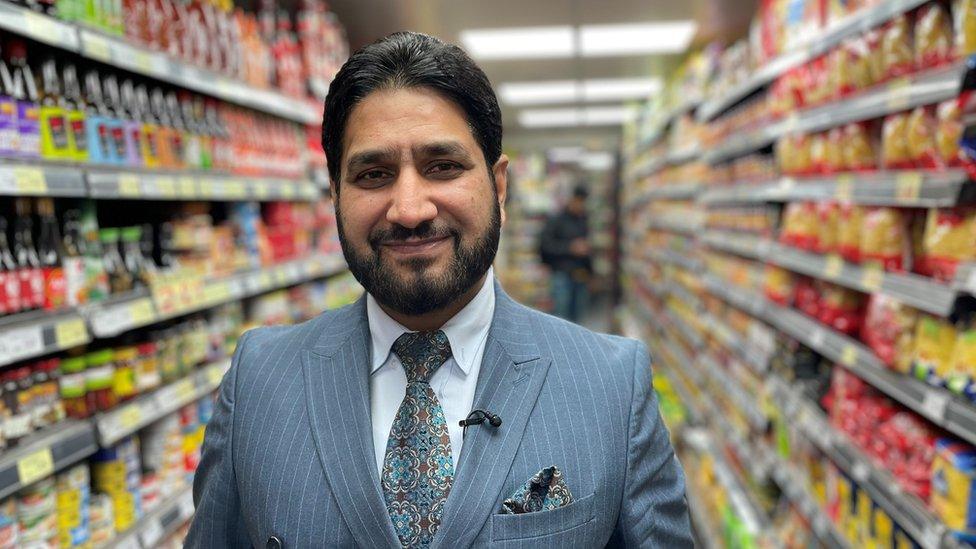
Abid Hussain has noticed people are spending less on their Eid celebrations
He acknowledges the prices of almost every item he sells - from spices and fresh meat to dates and honey - have risen due to huge increases in imports and wholesale costs. And customers are changing their habits to reflect that.
His customers would often buy in bulk to cook meals that would feed extended family, friends and neighbours, inviting many people over for the evening Iftar - or fast breaking. But this year the bulk buying has reduced.
"People are definitely holding back and the tills are showing that," he adds. "Everybody is feeling that pinch." Abid's sense of the squeeze rings true across the wider community.
Charity Islamic Relief UK told the BBC that an increasing number of Muslim families are struggling to make ends meet this Ramadan.
"Soaring costs of energy bills, food and essentials have impacted vulnerable families' ability to access necessities and this is a particular challenge for those fasting during the holy month," a spokesperson said.
The charity - which helps many projects overseas - is now increasing its support of UK food banks and says the organisations it supports are experiencing their busiest ever Ramadan.
One such group is Give a Gift in Leeds, co-founded by Rifhat Malik. That same April evening, she had gathered almost a hundred Muslims from across the city for a free Iftar. Anyone in need could attend.
"It's such a lovely feeling," she says. "That we can help somebody and just bring a smile to their face."
Rifhat set up the charity about seven years ago to support refugees in the city. But there's been a shift since the pandemic in those needing help.
"Now we're seeing people born and bred in Britain, on state benefits, who've never had to turn to a charity for help," she says.
She says her community had not been able to celebrate Ramadan and Eid twice over as they'd wish, thanks to lockdowns. And now there was a pressure to pull out the stops. "It's the same as Christmas. People go into debt, they want to spend on their children," Rifhat explains. "We want to give a good Eid, we want to give nice presents to our children and the families that we're working with, they don't have that."
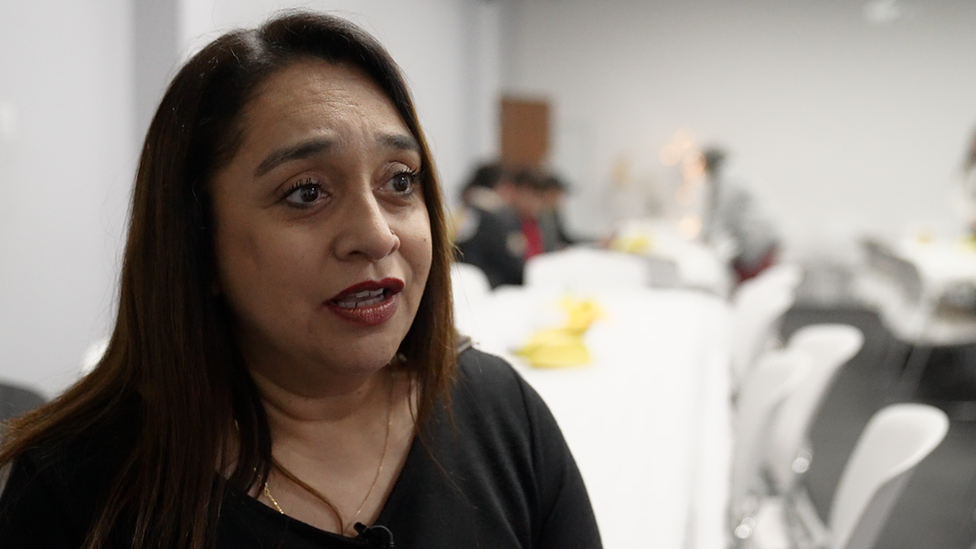
Rifhat Malik co-founded charity Give a Gift in Leeds which held a free Iftar
Later, the call to prayer drifted across the those assembled. Rifhat and her team stood motionless as those attending lifted the first sweet date and water to their lips. After, follows rice and chicken, pizza, spring rolls. Bunches of bananas and sugary Gulab Jamun finish off the meal. By the end, children are giggling and crawling under tables.
On top of the seasonal pressure, there is also increased social stigma. Islamic Relief report reluctance amongst the Muslim community to ask for or accept handouts. Rifhat has noticed the same. "One of the families actually felt embarrassed to come," she says. "They said, we get invited to break fast with people, and we normally have people in our house, and we can't reciprocate that."
But Rifhat is worried that this is just the beginning of a squeeze on those around her, a feeling mirrored by Abid in his store, too. He is a regular donor to Give a Gift, to try to help.
But Abid also knows the prices he pays are only going up, and he has to pass some of that on.
"I'm definitely worried about the future - and I've never been worried before," he says.
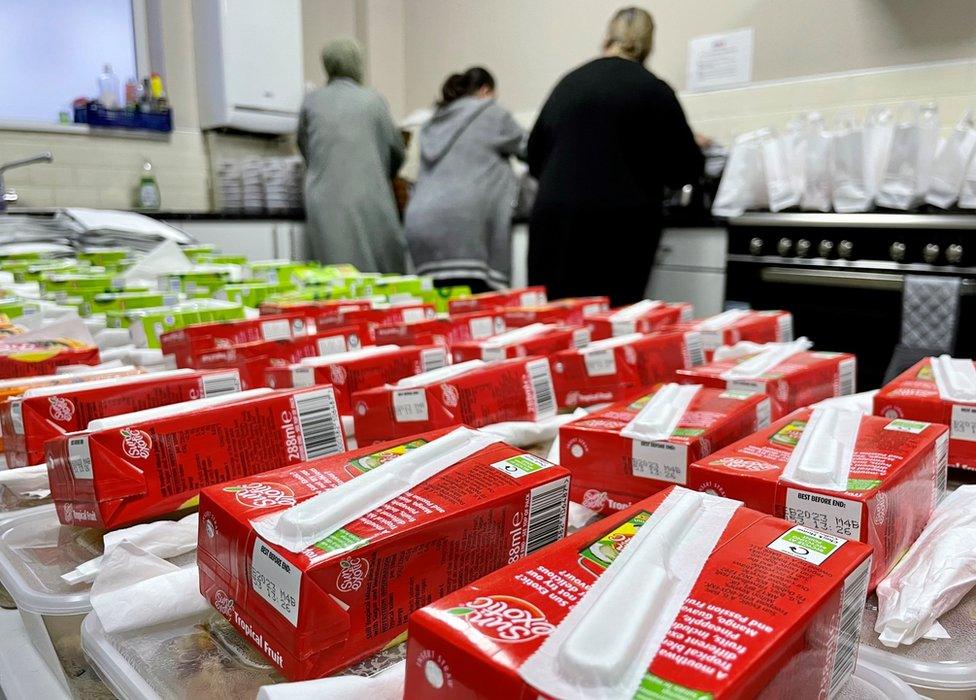
Volunteers at Give A Gift charity prepare food parcels
Related topics
- Published13 May 2021
